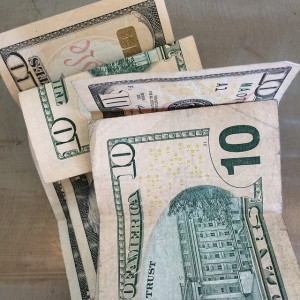Today I heard a newscaster say, “So we really are going to have a woman on the ten-dollar bill. Which historical figure do you think it will be?”
If you’re normal, you’re thinking Harriet Tubman? Betsy Ross? Rosa Parks? Meryl Streep? But if you’re not normal, like me, you’re wondering if that should be historical figure or historic figure. Let’s review.
Historical and historic are different. Historical signifies merely that something happened in the past or relates to history. Historic means momentous – deserving of a place in history.
Lisa’s report was mainly historical.
This is a historic day for our school.
With the distinction firmly in mind, choose the correct word.
1. We came across a lot of (historical, historic) information about our building in some newly discovered, 80-year-old documents.
2. The visiting scholar’s insights into today’s media contained a surprising number of (historical, historic) references.
3. The town’s (historical, historic) vote 30 years ago to build a six-lane bridge over the river ushered in a period of unprecedented prosperity.
4. So we really are going to have a woman on the ten-dollar bill. Which (historical, historic) figure do you think it will be?
The answers
In numbers 1 and 2, the correct word is historical. The information in the old documents and the scholar’s insights dealt with the past, with history, but neither is momentous. The town’s vote in number 3, on the other hand, turned out to be pivotal in the town’s growth. It was historic.
As for number 4, I’d say that’s a close call – maybe partly because we more often label an event as historic than we do a person. But any woman being considered as the new face of the ten-dollar bill surely made a historic (important, momentous) impact on our country, so I’d show that recognition with historic figure. If you disagree, weigh in.
“A” or “an”?
If something that will long be remembered happens today, should we call this a historic day or an historic day? Obviously, when an h is silent we say or write an herb garden or an heir to the throne. But although we’d never say or write an hearing aid or an hillside – because the h is heard – some of us use an historic instead of a historic.
Is an historic day wrong? No. Is it necessary? No.
When the h is heard, but the accent is on the second syllable (as in historic or habitual), a and an are both correct. Preferring an historic day does not make anyone more sophisticated, but if you like the sound of an historic, go for it.
In addition to presenting workshops on writing in the workplace, Norm Friedman is a writer, editor, and writing coach. His 100+ Instant Writing Tips is a brief “non-textbook” to help individuals overcome common writing errors and write with more finesse and impact. Learn more at http://www.normfriedman.com/index.shtml.

